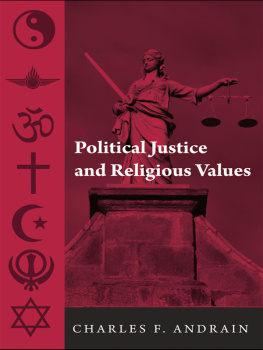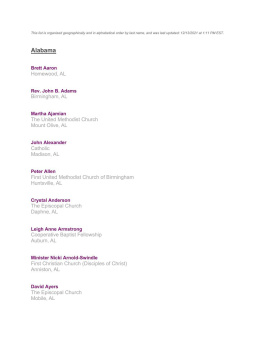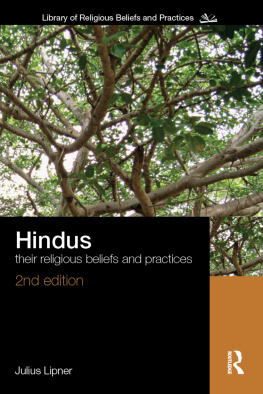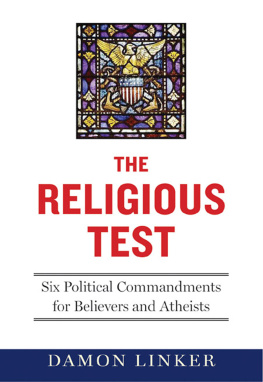Slone, D. Jason Assistant Professor of Religious Studies, University of Findlay
Theological Incorrectness
Why Religious People Believe What They Shouldn't
Print publication date: 2004
Published to Oxford Scholarship Online: January 2005
Print ISBN-13: 978-0-19-516926-3
doi:10.1093/0195169263.001.0001
Abstract: This book analyzes the concept of theological incorrectness, namely, why people believe what they shouldnt? It takes off from Justin Barretts notion of theological correctness, which contends that while religious believers produce theologically correct ideas in situations that allow them the time and space to reflect symmetrically on their beliefs, the same people can stray from those ideological beliefs in situations that require them to solve problems rapidly. It also puts forward a cognitive approach to studying religion.
Keywords: theological incorrectness,religious behavior,belief
theological incorrectness
end p.i
end p.ii
theological incorrectness
Why Religious People BelieveWhat They Shouldn't
2004
end p.iii

Oxford New York
Auckland Bangkok Buenos Aires Cape Town Chennai
Dar es Salaam Delhi Hong Kong Istanbul Karachi Kolkata
Kuala Lumpur Madrid Melbourne Mexico City Mumbai Nairobi
So Paulo Shanghai Taipei Tokyo Toronto
Copyright 2004 by Oxford University Press, Inc.
Published by Oxford University Press, Inc.
198 Madison Avenue, New York, New York 10016
www.oup.com
Oxford is a registered trademark of Oxford University Press
All rights reserved. No part of this publication may be reproduced,
stored in a retrieval system, or transmitted, in any form or by any means,
electronic, mechanical, photocopying, recording, or otherwise,
without the prior permission of Oxford University Press.
Library of Congress Cataloging-in-Publication Data
Slone, D. Jason.
Theological incorrectness : why religious people believe what they
shouldn't / D. Jason Slone.
p. cm.
Inlcudes bibliographical references and index.
ISBN 0-19-516926-3
1. Psychology, Religious. 2. Cognitive consistencyReligious
aspects. I. Title.
BL53 .S575 2004
200.19dc21 2003007588
1 3 5 7 9 8 6 4 2
Printed in the United States of America
on acid-free paper
end p.iv
Dedication
To Brooke
end p.v
end p.vi
preface
Two facts fascinate me about religion. First, there is more than one religion in the world. That's a strange fact, given that each religion is supposed to be true. Second, religious beliefs are incomplete. Since people rarely (if ever) actually get to talk with god(s), believers have to guess about quite a lothow we originated, who/what God is, what God wants from us, what life is all about, how humans ought to live, why bad things happen to good people and good things happen to bad people, and so on. This, too, is a strange fact, given that religions are supposed to provide absolute truth.
It wasn't until I read Justin Barrett's (1999) work on theological correctness that I began to piece together an answer to these questions, and many others. His work showed me that the answer was in my head all along. More accurately, the answer was in all of our headsthe answer to these puzzles is to be found in the workings of the human mind. This is the insight the cognitive sciences have to offer students of religion: religion is the way it is because the mind is the way it is.
Though Barrett's work linked the human cognitive capacity for multiple levels of representation with theological belief, I realized that the same body of research could explain the central problems I lump together in this book as theological incorrectness, or why religious people believe what they shouldn't. Religious people believe what they shouldn't because, the psychological research
end p.vii
shows, people think lots of things they shouldn't in general. The human mind is a limited-capacity information processor and therefore, though effective for solving most of the tasks involved in everyday thinking, prone to reasoning errors. Since religion is a product of ordinary cognition, religious people are prone to religious reasoning errorsat least when compared against official theological doctrines.
The insight that religious belief and its corresponding behaviors are explainable at the level of cognition confirmed my sense that advances in the understanding of cultural phenomenaincluding not just religion but also music, art, language, sexual attraction, altruistic virtue, in-group coalitionism, out-group-directed violence, and so onare going to be made through interdisciplinary research that connects research about culture with research about cognition. Understanding religious belief requires scholarly engagement at multiple levels of analysis; being interdisciplinary, the cognitive science of religion allow scholars to bring together research from otherwise disparate fields like comparative religion, philosophy, anthropology, psychology, and evolutionary biology toward a full account of the origins and functions of religious belief and action. In this regard, this book addresses only one particular feature of religion, but it is a broader plea for greater infusion of the sciences into the humanities. This book is my small contribution to E. O. Wilson's () call for consilience.
The originality of this book is in its application of new explanatory theories of religious behavior to compelling problems in the study of religion: Is Buddhism really like all the other religions? Why is divine sovereignty a difficult concept to employ in religious thinking? Why are luck beliefs so widespread? Just as important, however, this book provides a survey of the paradigmatic theories in the study of religion broadly and the cognitive science of religion specifically. The book is designed not just to explain theological incorrectness but also to show how theoretical assumptions about human behavior inform scholarly accounts of religion.
As such, I must acknowledge those individuals who have contributed to my theoretical approach to the study of religion. First and foremost, I must acknowledge the profound influence of Tom Lawson on my understanding of religion. Were it not for his pioneering scholarly work and his personal intellectual guidance, this book would not have developed as it has. Lawson's published work has shown conclusively that a cognitive science of religion is
end p.viii
not only possible but in fact desirable, and, just as important, his private dialogues with students and colleagues have convinced a new generation of scholars that the cognitive sciences provide the best methods we have (currently) for understanding religious behavior.
Second, I must acknowledge the work of a cadre of scholars in the field from whom I have also benefited greatly. In addition to Tom Lawson, I am indebted to Justin Barrett, Jesse Bering, Pascal Boyer, Stewart Guthrie, Deb Kelemen, Brian Malley, Luther Martin, Robert McCauley, Joel Mort, Todd Tremlin, and Harvey Whitehouse for their insights into the cognitive science of religion. Though the number of scholars working in the field is growing each day, I have particular debts to these individuals.










